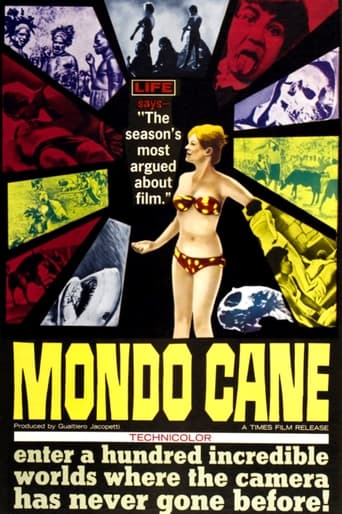



Am I Missing Something?
At first rather annoying in its heavy emphasis on reenactments, this movie ultimately proves fascinating, simply because the complicated, highly dramatic tale it tells still almost defies belief.
View MoreExcellent characters with emotional depth. My wife, daughter and granddaughter all enjoyed it...and me, too! Very good movie! You won't be disappointed.
View MoreThe storyline feels a little thin and moth-eaten in parts but this sequel is plenty of fun.
View More"Mondo Cane" (1962) is an update of Homer (fl. c. 800 BC and Aesop (fl. c. 620 BC - 560 BC).....a warning to avoid the bad guys!---------------Throughout cultural history in almost all cultures, cultural leaders and artists of fame and importance warn audiences to think twice about people and situations which look good but which are dangerous and should be avoided.Two early examples are Greek authors Homer and Aesop, and the list at least from their times now thousands of years past is long, and extends to the present day, and into the art of current day cinema.Gualtiero Jacopetti, credited as the main creator of the documentary movie titled "Mondo Cane" (1962 Italy) is a recent example of Cassandra type artists/ cultural leader who scream out "Beware!" to the rest of us.Do most people get the point, take the advice of warning givers in the tradition of Homer, Aesop, and Jacopetti, and many, many others (some listed below)?No....but the warnings continue in an unending stream, and are a noticeable part of cultural history, worth respecting as a phenomenon, even if not agreed with or heeded, which mostly, warnings given by cultural leaders are not (which explains why so few people presently or ever during past history are cultural!).What's the big deal (the latest big deal) about Jacopetti and his "Mondo Cane" (1962) movie, eh?We see the beautiful people (mainly the beautiful bathing beauty girls of 1962's "White Australia") at the start of the movie contrasted with others from places like Borneo, Fiji, and Malaysia (rural Italy and sports enthusiast Portugal are also included).The message is clear...........most of the people and much of what some people in the world do is ugly, uncivilized, dangerous, and should be refused and avoided.This is not a "love thy neighbor" movie, and refusing "love for thy neighbor" is not a new theme historically.Homer's "Trojan Horse" story part of his Odyssey epic poem is an early example. Accepting the big horse outside the gates of Troy might seem like a good idea, but, in hindsight, we realize it would be better for the besieged Trojans to have left it where they found it, and best to destroy it where they found (outside the gates of Troy) if that had been practical.Two hundred years after Homer (fl. c. 800 BC), roughly, came Aesop (fl. c. 620 - 560 BC), also a Greek who also lived in present day Turkey (aka "Anatolia").Aesop gives us yet another "avoidance is best" story with his "Farmer and the Viper" fable of fame.For those who don't know, "The Farmer and the Viper" is one of Aesop's Fables, numbered 51 in the Perry Index. It (Aesop's Fable) has the moral that kindness to the evil will be met by betrayal and is the source of the idiom 'to nourish a viper in one's bosom'. The story concerns a farmer who finds a viper freezing in the snow. Taking pity on it, he picks it up and places it within his coat. The viper, revived by the warmth, bites his rescuer, who dies realizing that it is his own fault. In an alternative version, the farmer brings the viper home to warm by the fire. When it threatens his wife and children, he kills it with an axe. It is the latter version that appears in La Fontaine's Fables (VI.13) as Le villageois et le serpent; this ends with the detail that the farmer cuts the snake in three and the parts struggle to re-unite themselves.The "brotherhood of man" doesn't extend to vipers (Aesop's opinion) any more than it extends to Trojan Horses (Homer's opinion).Cultural history marched on into relatively recent times, and the cavalcade of writers giving us "Beware" type messages continued.Thomas Hobbes, Voltaire, the Marquis De Sade, Darwin, Spencer, Thomas Henry Huxley, William Graham Sumner, movies of the 1960's protest era including "Mondo Cane," (1962), "Marat/ Sade" (1966), and "Zabriskie Point" (1969), and more recently William O. Wilson, Harvard University's embattled "Sociobiologist" of fame, still alive, kicking, and writing (in his 80's as of 2013) "Beware" messages to us all about the problems of "Inclusionism" in the same spirit as Homer urged us to avoid (i.e. "don't include) Trojan Horses.It's up to us to choose........the Australian bathing beauty girls or the Borneo people (who take up much more of "Mondo Cane" 's screen time, so the avoidance point Jacopetti makes is all the more emphatically made......ignored though it was in the "brotherhood of man" historical period which came immediately after the 1962 release of the "Mondo Cane" movie). We are told (by some, not all) that we are "all brothers" and it's not a good (or moral) idea to avoid particular groups of people, regardless of visual and other evidence we take in. Is that true?The long train of historical (including cinematic) cultural "Cassandra's" include many who say (nay, yell loudly, as Jacopetti does in "Mondo Cane" 1962), "No, it is not true, and don't be taken in by the tidal waves of copious propaganda urging otherwise for self-interested, hidden agenda reasons (often not identified or discussed by the warning givers)."Only the wise survive......... most of the time. Be wise.........it can't hurt.-------------------------Tex (David) Allen is a SAG-AFTRA actor who has written many reviews of books and movies.Email: TexAllen@Rocketmail.Com
View MoreI watched this today after having it on my NetFlix queue for a while, every once in a while I like the shocker flicks, and this one intrigued me... I was very disappointed... The opening was a little difficult to watch, and proved to be the most shocking to me. The rest of the film was hardly shocking at all, sure it had it's moments, the bull scene and the people bloodying up their legs for the Jesus run, but overall it was just a series of boring and highly forgettable stock footage clips accompanied by cheesy narration... The only thing "shocking" about this is that anyone would find it "shocking" to begin with... I guess I was just expecting a little too much.
View MoreI saw "Mondo Cane" twice or more in the early '70s. I first saw it in boarding school as part of the Saturday night film series (this being 1971). At the time kids thought it extremely racy and daring; to see it was an act of rebellion. Teenagers made it a rite of passage. That said, it never carried an x-rating or was banned, that I know of. I recall the cargo cult sequence most vividly, along with the dog-eating segment and a few others. I found the narration often humorous but rather self-righteous and condescending at times. And that lush theme music! In those days (early '50s to early '70s), every film had to have a hit song, often mushily romantic. Even shockumentaries had to have one (that may have died out by the time of "Cannibal Holocaust," however). "More" helped balance out the often very seamy aspects of the film. At school the kids often snickered at the various bizarre scenes, or made ribald comments. Catcalls occasionally erupted. I thought the film daring at the time, sometimes gross. I saw it again a couple of more times, though not after the early '70s. The film seemed less avant garde or challenging each time. Now it seems tame and dull compared to the shockumentaries that followed it. I have little interest in seeing it again, and have had no chances to do so (though you can get it on DVD). Repertory theaters where I've been have not shown it in recent years, nor has it appeared on television (to my knowledge). According to descriptions, it has numerous scenes of cruelty to animals (which I thankfully don't recall), and thus I would not be inclined toward repeat viewings. "Mondo Cane" did set the stage for reality TV and predicted much of what would happen in today's exploitative television and underground film world. That gives the film at least some historical interest. In retrospect, the cargo cult sequence is the most poignant.
View MoreAs a big fan of cult cinema, there's usually at least one film I like in each of the main genres (with the exception of Nazisploitation), and although this is only the second 'Mondo' film that I've seen; I doubt I'll ever have a favourite in this one. Surprisingly, there was actually quite a few of these films made (I could never see them having mass market appeal, but I'm wrong apparently) and Mondo Cane was the one that kicked it all off. These films would go on to try and top each other in terms of shock value as more and more were made; but since this was the first one, it's not as shocking as some of the later ones. The Italian word 'Mondo' literally translates into English as 'world' and that is actually quite fitting as this film could be described as a visual representation of various things that go on in both the animal and human worlds. The film takes a documentary approach, although it couldn't really be considered a documentary as not all of it is exactly real, with several obviously fake sequences getting mixed in along with the real stuff.The film is not very strong, shock-wise, in terms of gore or nastiness; but it is an entirely bleak film. Just about everything in it paints a bad picture of the world; we've got tribal men taking revenge on a shark, turtles baking in the sun, people gathering up shark fins off the beach etc. A lot of the footage shown in the film is fake, and unfortunately most of is obviously fake too. This is a shame because a lot of what the film has to say is interesting; it's just hard to take seriously. I can't say I'm a big fan of documentaries in general, but rated as a documentary; this film falls down again. There's a voice-over that runs throughout, and is actually quite entertaining and informative, but there's no real narrative to the film and it does feel a lot like the filmmakers just filmed a load of stuff on a similar topic and then just stuck it all together - and to be honest, I reckon that probably is what happened. There's not really very much to recommend this film for and I wonder who it was actually aimed at; but it's interesting for the fact that it's the first 'mondo' film and some of the things in it are worth seeing...even if they are fake.
View More